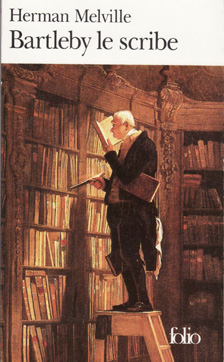Herman Melville: ‘Bartleby, the Scrivener’
by Sophie HannahI’m not sure if Herman Melville’s ‘Bartleby, the Scrivener’ is a very long short story or a very short novella, but I’ve always thought of it as a story and, ever since I first read it for my English and American Literature degree in 1991, it has been my favourite short story. It contains three of my favourite things in literature: mystery, rebellion, and a strange person or people. It is also so much more than the sum of its parts, and impossible to reduce to a moral or message. However many times you read it, it remains the baffling tale of a peculiar man, and never loses its mystery or intrigue.
We hear a lot these days about sympathetic characters, but what is required in order to make us sympathise with a fictional character? For many readers, it seems, the character must be pleasant-mannered and morally virtuous – and of course these qualities should not be underrated – but I must confess that I’ve always tended to sympathise and identify most with two kinds of character in particular: those whose peculiarities and deficiencies prevent them from fitting in well in ordinary environments, and those whose lives are hampered by their inability to solve the mystery of a significant other. (Yes, I know – as one of the psychologists in Fawlty Towers said of Basil Fawlty, “There’s enough material there for an entire conference.”)
In ‘Bartleby’ those two character types – the misfit and the puzzled truth-seeker – are represented by Bartleby himself and by the narrator, who has the misfortune to employ Bartleby in his office. The story is very simple: Bartleby starts off as a conscientious worker. Then one day, when asked by his boss to perform a certain task, he says, “I would prefer not to.” From then on, he declares that he would prefer not to do almost everything that is required of him. He doesn’t say, “I refuse,” or “Get lost!” – he merely states his negative preference and then fails to do the thing he’s been asked to do. I don’t want to give away any more of the story, but it is absolutely gripping, and the mystery builds and builds. Gradually we learn that this deceptively simple tale is about far more than an intransigent office worker.
A question that has always fascinated me is: what are the literary and cultural relatives of ‘Bartleby’? One of my favourite films of the 1980s was Ferris Bueller’s Day Off, which has in common with ‘Bartleby’ a protagonist who is unwilling to do what is expected of him. There are huge differences, of course – Ferris is a hedonist, while Bartleby seems determined to reject all that life has to offer – but I remember reading ‘Bartleby’ for the first time and thinking, “Oh, wow! This is exactly like Ferris Bueller’s Day Off, only much gloomier!” Another cultural relative is Larry David’s comedy show Curb Your Enthusiasm, which hilariously portrays Larry’s endless inability to be his true flawed self in the world without horrifying and alienating everyone he encounters.
Ferris Bueller, ‘Bartleby’, Curb Your Enthusiasm – the central theme of all three is the impossibility of being true to oneself at the same time as complying with social convention. Fawlty Towers, indeed, could also be seen as related; the humour there comes from the shocking unsuitability of Basil’s personality for the role of hotel manager. ‘Bartleby’ is the subtlest and most brilliant of all these relatives, however. It makes you wonder, “How can a man bring such tragedy upon himself simply by expressing his preferences so mildly?” and “How can trying to force someone to act against their wishes be the only way to save them, and is it a legitimate tactic?” And perhaps the most important question: “How can the desire to be left alone be so controversial?” Introverts must love this story; anyone whose personal boundaries have ever been violated must adore it; all those who have worked in an office for a loathsome boss want to marry it (or so I am told by a reliable friend).
‘Bartleby’ had a powerful effect upon me. I’m sure Herman Melville didn’t give much thought to its potential as a self-help text, but it certainly helped me. It made me think about all the occasions on which I might say “I would prefer not to”, and I have been saying it ever since.
If you haven’t read this brilliant story already, please read it now. Unless you would prefer not to, of course.
 Sophie Hannah is a bestselling novelist and poet. Her latest psychological thriller, The Carrier was named Thriler of the Year in the 2013 Specsavers National Book Awards after she made the shortlist with Kind of Cruel in 2012. Her earlier novels The Point of Rescue and The Other Half Lives were adapted for ITV1 under the series title Case Sensitive. She lives in Cambridge with her husband and children and her novels are published in the UK by Hodder & Stoughton.
Sophie Hannah is a bestselling novelist and poet. Her latest psychological thriller, The Carrier was named Thriler of the Year in the 2013 Specsavers National Book Awards after she made the shortlist with Kind of Cruel in 2012. Her earlier novels The Point of Rescue and The Other Half Lives were adapted for ITV1 under the series title Case Sensitive. She lives in Cambridge with her husband and children and her novels are published in the UK by Hodder & Stoughton.
sophiehannah.com
‘Bartleby, the Scrivener’ has been published on its own and in various story collections including Oxford World’s Classics’ Billy Budd, Sailor and Other Tales and Penguin Classics’ Billy Budd and Other Stories.


